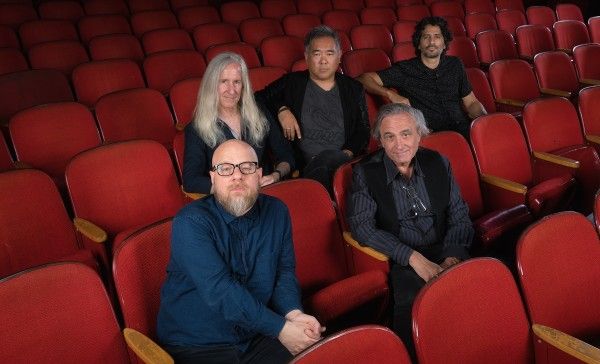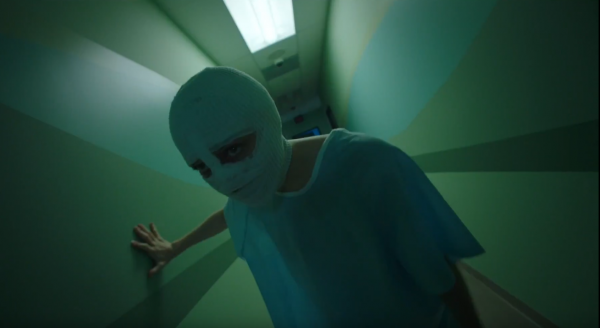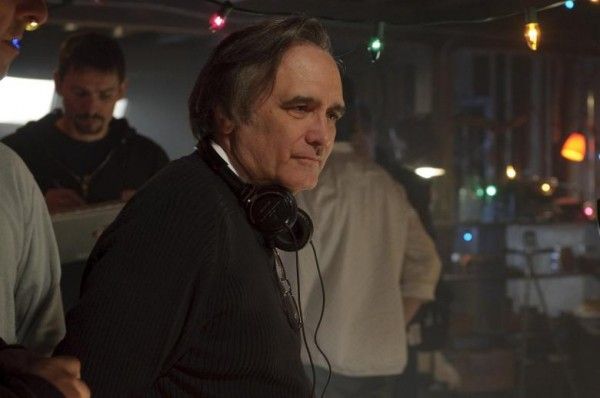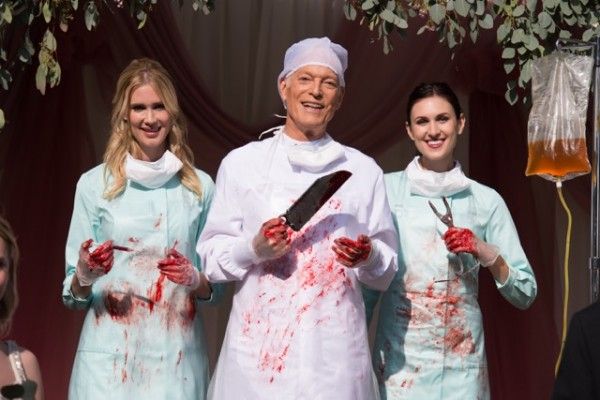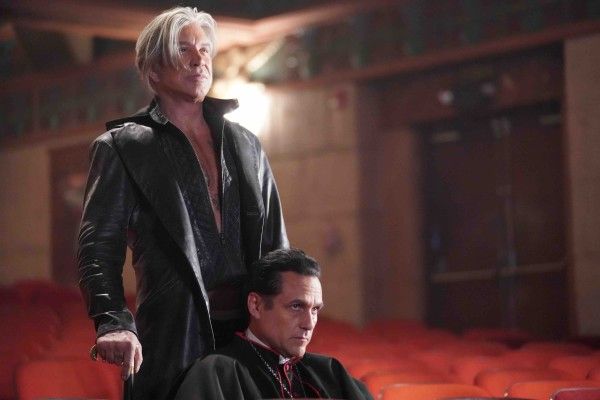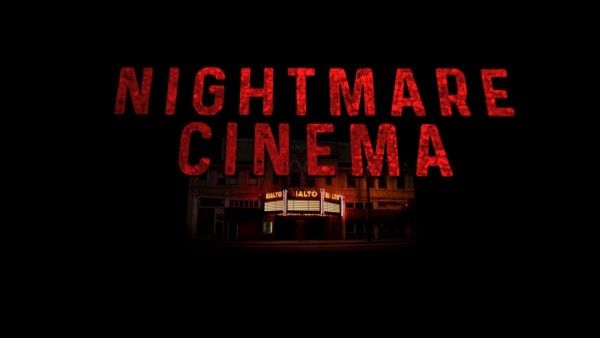Joe Dante is best known for beloved genre classics like Gremlins and The Howling, but he’s also a filmmaker who knows a whole lot about horror anthologies. Over the years, Dante directed segments for the iconic TV anthologies The Twilight Zone and Amazing Stories (not to mention Twilight Zone: The Movie), as well as two episodes of the sadly short-lived Masters of Horror. For Nightmare Cinema, a new horror anthology steeped in the tradition of the subgenenre, Masters of Horror creator Mick Garris unites a new round of filmmakers, including Alejandro Brugués, David Slade and Ryûhei Kitamura, and he turned to Dante for one of the film’s strongest segments, the throwback psychological horror ‘Mirari’.
Following Nightmare Cinema’s world premiere at the Fantasia International Film Festival (you can read my full review here), I sat down with Dante to chat about his Eyes without a Face-inspired short and the art of making a good horror anthology. The filmmaker also showed off his impressive knowledge of the subject, discussing the history of the horror anthology, his obscure favorite, what kind of stories catch his attention at this stage in his career, and a lot more.
You are someone who knows a thing or two about anthologies. I'm curious, in your opinion, what are the elements that make for a successful horror anthology?
DANTE: Well you know, they do go back quite a ways. There have been some silent film horror anthologies as well, but the best-known horror anthology is Dead of Night, which was a '45 British movie. Which has the best framing story, in that the guy ... it's a dream that the lead character is having. It's a very famous movie, and it made a lot of money even in America where it was heavily cut. But then they sort of fell out of favor, except for Somerset Maugham kind of movies.
Then the Italians in the late '50s, early '60s kept doing a whole lot of pictures like Stromboli, different stories about men and women. And it didn't really take off until Amicus did Dr. Terror's House of Horrors which was a big hit and solidified their formula of being able to supply a lot of big name stars for very little money because they all worked for only a couple of days. So, when that picture hit it off it lead to Tales from the Crypt and Torture Garden and The House that Dripped Blood and a whole bunch of other films in that genre. There must have been ten or twelve of those pictures and they lasted over a decade or so and it became quite popular.
The knock on anthology shows always is that they're uneven because not all of the stories are of the same interest to different audiences. So you want to have a funny one, you want to have a scary one. Some people like funny, they don't like scary, and vice versa. So, it's a little tricky in that regard. The difficult part is having a frightening story that justifies telling the story. In this case I thought the idea of a haunted movies theater was pretty good peg to hang the stories on.
A lot of times when I talk to directors about anthologies they say that they feel less pressure because there's not a whole budget on their back and...
DANTE: Also they don't have to carry and entire movie.
Exactly right.
DANTE: Which is very important because when you're making a feature film you're constantly aware of the fact that you've got three acts. And you have to deliver on all of them and pace it and have the whole thing be a satisfying experience. Whereas if you're in among a number of other stories you don't carry the whole burden. If your story happens to not work out as well as the others, it's too bad. It's not gonna hurt the movie because there's other stories. So you have more freedom. You have more freedom to experiment. You have more freedom to try things that may or may not work. The down side is that usually there's not a lot of money because there's other stories that need paid for. But in this case, we were promised creative freedom.
This is the formula that Mick created on the Masters of Horror series, which enabled him to hire a bunch of well-known horror names to do a series of one-hour films for not a lot of money and in not a lot of time but with creative freedom. So the idea was you could go and you could do a story about whatever you wanted. You could shoot it the way you wanted it and you could cast it the way you wanted it, and it was your movie. It's a little move but, it's yours, not an episode of something else. It's yours. And here again the same rule applied. In order to get these people to work on the movie it was like, "Well, you can do whatever story you wanted to do and provided that we can afford it, you can do it whatever way you want." That kind of freedom is very tempting for people who've been working the studio system because the studio system does not work that way.
Right.
DANTE: There are a lot of people looking over your shoulder telling you what to do. There's marketing people. There's tests. There's all sorts of stuff that you have to deal with to try to get your vision through. And then something like this, it's less work and that there's not a lot- it doesn't take as much time and when you're done you can say, "From this point to this point, this movie is mine. It's the way I wanted it to be."
So knowing that you had both the freedom and the sort of budgetary constraints, how did you hone in on the story that you wanted to tell for this one?
DANTE: Well I knew that some of the other stories were going to be rather spectacular and have a lot of effects and gore in them and I figured that I would try to be- take another road. And it was important to me to have a female protagonist, because I think in horror movies the cliché of the girl running and falling down is kind of over. And so, not that I don't love King Kong and all that stuff but, that's a sort of fairy tale attitude. So, it was important to me to have a character who I could tell the story through and would be the point of view for the audience. It's essentially a nightmare that she gets into based on the idea that she wants to fix her face for her boyfriend and doesn't realize that everyone around her is completely insane. And doesn't realize mental banter of the story. It was sort of like a Twilight Zone level lens and it all takes place basically in one place so it wasn't that expensive. It was something that was- it was easy to do well on the budget and on time.
So much of this lays on your actress and she has to do most of it with her face covered. How did you find the right actress for it?
DANTE: Well actually she was recommended by Richard Chamberlain. He had worked with her on something. I guess a play. And we auditioned a lot of people, many of whom were very good but, she as an artist had something special. And given the fact that her face is covered for half the movie, she's able to act with her eyes. And there's a desperation that comes out of her eyes that's very similar to Eyes Without a Face, the French movie, which I kept having in my head every time I looked in the monitor. It looked like the same movie and I think she's the key to making it work.
When have so many different stories in the same film, and as you said, you knew some were gonna be more visceral high action, what were fears you wanted to touch on and sort of trigger in people?
DANTE: Well, knowing that the fears of the other stories are gonna be triggered, people are gonna be going through various bouts of fear watching the other stories. Mine is of- I think a lot of horror is loss of control. I think the things that people- we fear death which is the giant loss of control and then there's the idea of just not being in control of your own life. And I think the effort that the heroine to try to control something in her life that goes spectacularly wrong, meaning she trusted the wrong people, is an anxiety that people can related to.
Definitely. Probably every living adult. Do you have a favorite anthology or one that you've found in your life you've returned to more than others?
DANTE: That's a good question but, because of the unevenness factor and the fact their- none of them have a perfect record of great stories. I do like that and I- there's a British film called Three Cases of Murder that is very obscure but, has a great first story about a guy who lives in a painting. He's the painter and he lives in the painting and he comes out at night and tries to dragoon people from the museum into the painting, to get lamps from a guy who lives there to light the windows of the painting. It's the creepiest thing. It's directed by very unknown woman director named Wendy Toy who was basically a stage director but, did a couple of pictures in the early fifties that are really quite amazing. So, I do find myself returning to that one quite a bit even though the first story is the best one.
That's cool. I've never heard of that. I'll have to seek that out.
DANTE: You'll have to seek it out... It's really a good story.
So, of course I'm always curious about what you're doing and keeping busy with.
DANTE: Yes, me too.
Working on a new film right now? Are you focused on promo mode for this?
DANTE: I'm always working on something. Well I'm in promo mode while I'm here but, no. I have projects that are- it's not like I need to work on them, I mean they're ready. They're done, but I'm working on the funding. And the funding is contingent on the casting, and the casting and the funding are also contingent on where your gonna shot it because you want to use the money that you get from those places. If you're gonna do the special effects in Belgium and we can get some Belgian tax money, it's all that.
I never used to have to do this part. I was the director. The producer came in and said, "Do you wanna do the movie?" I'd do the movie and they would take care of all that. Now I have to do it and it's not fun and it takes forever and I've got- it took ten years to get this thing done for all the same reasons. You get the funding. One brick falls out of the funding and everything falls apart and you got to start over. I've been doing that with a couple of projects for at least that long.
Guillermo del Toro once described it to me that he's like a salesman peddling his wares from door to door.
DANTE: He is and when you go door to door and someone lets you in and you get to peddle something and they say, "Well we don't want that," you have to be able to pull your other pocket right, "How about this one?" I mean how many things do you have in your drawer that you can pull out and say, " You've got money, here make this." And that means you've got to work three times as hard because you've got to develop all of those things to a pint where you can actually show them to people. So, it's pretty exhausting.
With a career as expansive as yours, you've touched on so many different parts of the genre over the years. What are the stories that appeal to you at this stage?
DANTE: Well I mean I was always- In my first movies I hawked back to the movies that I had seen. Like Piranha is The Creature from The Black Lagoon; The Howling is The Wolf Man. I had touched on this stuff. I felt that I was adding to the lore. But now everything's different. I mean the whole world has changed almost to a pint where it's almost unrecognizable. So it becomes more important to find something that's worth doing that has some kind of actual merit and maybe some connection to the real world because the real world is now so topsy-turvy and the assumptions that we used to make are so thrown on their head, that to try to find something that you can invest in, in yourself, that you feel is worth your time becomes more difficult.
I mean I had a rule, I had a rule. I would never do anything that I wouldn't go see. So if I'm offered something that is not a movie I would go see I'd say, " I don't got to do it. This should be something I wanna do, this should be something I can relate to." Finding things to relate to these days- you can't even do political satire anymore because it's just everyday is a new chapter in things that you can't satirize anymore because it's all happening in front of you.
Nightmare Cinema premiered at Fantasia International Film Festival.


